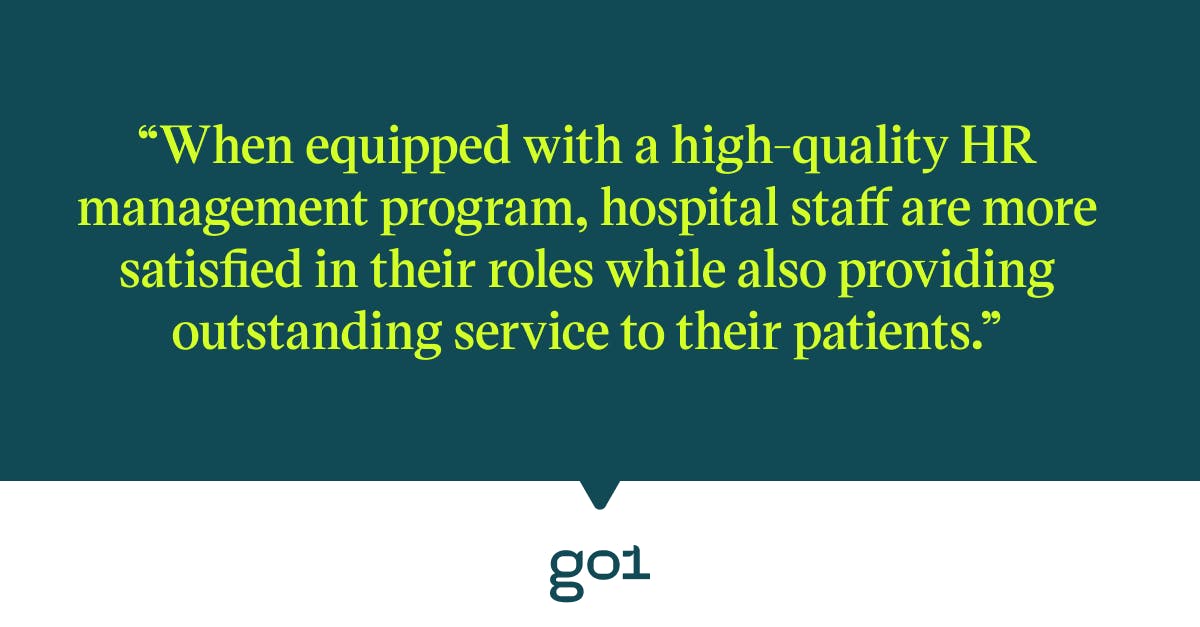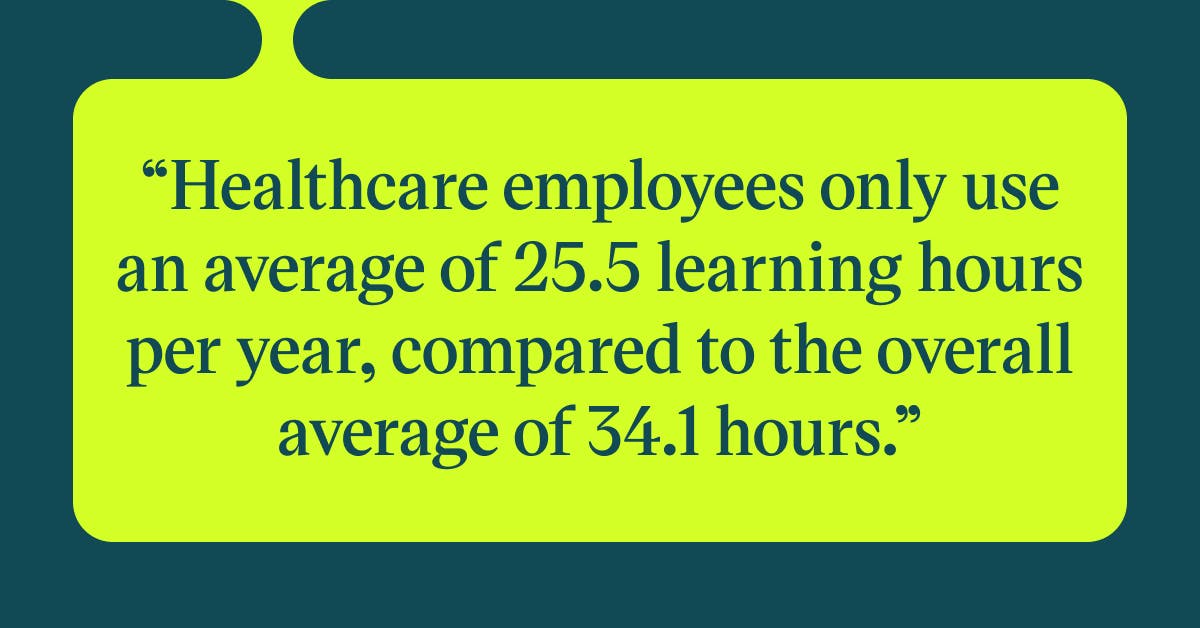
The importance of human resources in the healthcare sector

Behind every great system is an organised team. This is especially true in the healthcare industry, where a dedicated human resources team can help effectively recruit employees, train staff, and implement safety measures in the workplace. As such, the importance of human resources in the healthcare industry cannot be overstated, with benefits ranging from providing an orderly, effective facility to giving staff the most accurate and up-to-date training.
When equipped with a high-quality HR management program, hospital staff are more satisfied in their roles while also providing outstanding service to their patients.

Here’s the thing: staff training is one of the most crucial tasks a human resources team can provide for a healthcare facility. Yet, according to Southern Illinois University Carbondale, staff shortages are surging in hospitals as millennials are leaving this sector — primarily due to poor job satisfaction linked to, you guessed it, a lack of training. Not only that, but the World Health Organisation found that 15 million more health workers will be needed by 2030, primarily in lower and middle-income areas.
According to one report, only 27% of respondents say their organisation is prepared for a nursing shortage to a high or very high extent, while nearly 10% of respondents say their organisation is not at all prepared for a nursing shortage.
So, what can teams do to overcome these challenges and provide better training for healthcare staff? We’ll take you step-by-step through the importance of training in the healthcare sector, offering concrete ideas to implement better, more effective training. We'll start by emphasising the importance of training in the healthcare sector, before analysing the benefits of training healthcare teams online and the benefits of managing training online.
Importance of training in the healthcare sector
Imagine starting a new job without knowing the specifics of exactly what your position entails. You’re left in the dark, grasping at straws to figure out what to do next. In most new jobs, this would be challenging. In a hospital, it would be a nightmare. Where do you even start? Unfortunately, this scenario occurs all too frequently, and it’s incredibly frustrating for employees.
While this would be concerning in most industries, in the healthcare industry, it can quite literally be the difference between life and death. Having accurate, up-to-date knowledge is vital for healthcare workers, as they often work in a faster-paced environment. If staff can’t keep up with the workflow, the facility can’t provide the most effective treatment, thereby putting patients in danger. Plus, the knowledge and experience staff gain in their position can help prepare them for higher-level positions in the future.
As Health Management explains, “because the healthcare industry is continuously evolving, technologies considered best practice today can change drastically in just the span of a decade. That’s why care providers have to regularly keep up with new techniques and technologies and expand their knowledge and skills – which means continuous education is not a nice-to-have but an absolute necessity for any healthcare professional who wants to provide high-quality patient care.”
Healthcare training statistics
According to industry experts, millennials, more than any other age group (40% versus 20% of baby boomers), are less satisfied at their job unless they receive the proper training, feedback, and fulfilment from their work.
Despite this, ATD’s 2019 State of Healthcare Training Report found that, on average, healthcare organisations only spend $602 per employee per year on training. By comparison, Statista finds that the average L&D team spends $1,308 per employee per year for all organisations. To put it another way, healthcare organisations only spend 46% of the global average on employee training, which doesn't make for pretty reading.
Further, ATD’s report found that healthcare employees use an average of 25.5 learning hours per year. Again, this does not compare favourably with the overall average of 34.1 learning hours per year for all industries.

Worryingly, this lack of training is leading to significant worker shortages. As of 2017, 90% of hospital leaders were worried about finding clinical staff such as physicians, nurses, and specialists in the next 10 years. Moreover, nearly 20% already faced shortages of nurses, according to a survey by Prudential.
With this in mind, PWC's 2020 Top Health Industry Issues Report found that 45% of healthcare providers said 'having the right talent' was a barrier to their organisation's digital strategies. On the other hand, 26% said that digitally upskilling their existing workforce was a key priority, while 27% said hiring employees with skills to support new capabilities, products, or services was their top priority.
Finally, a survey of more than 5,000 healthcare professionals by Relias found that 60% of healthcare organisations don't have well-developed methods to evaluate whether training is being put into practice on the job. While this is concerning, it is an improvement from 74% of organisations in 2017.
Relias' survey also found that only 33% of organisations said all staff receive regular training and education. As a result, 47% said their organisation needed to align all healthcare professionals.
HR teams, healthcare employees, and management must work together to reverse these concerning trends and recognise the importance of ongoing training in the healthcare industry.
Training healthcare teams online
One way to deliver effective training is to train your healthcare team online. Numerous online courses are available to train new and established staff on everything from general workplace subjects to more specific health and medicine topics.
If you need some support training your healthcare team online, Go1 can help. Go1 offers many healthcare-related courses from world-class partners, ranging from our Healthcare Compliance Bundle to Hazard Communication for Healthcare and even Hand and Wrist Anatomy for Healthcare Professionals. And these are only the tip of the iceberg. To access these courses and more, start your free trial today.
Benefits of managing training online
Some HR staff may be sceptical when it comes to managing online training for healthcare workers. This initial hesitation is completely understandable. However, we know how busy healthcare staff are and how difficult it can be to organise traditional training sessions. With so many competing priorities, it’s easy to see why many healthcare workers struggle to find free time for training. After all, if you’re faced with a decision between urgent patient care and optional training, it’s obvious which task should take precedence.
Again, to re-emphasise, healthcare employees use an average of 25.5 learning hours per year compared to the overall average of 34.1 learning hours per year for all industries. That works out to be just over 4 minutes per day, and that's including weekends! Offering online training for healthcare staff can ease many of these blockers and frustrations by allowing healthcare workers to access training when, where, and how it suits them.
The good news is that online training in the healthcare sector is slowly trending in the right direction. According to Relias, 47% of healthcare organisations now use an LMS, up from 39% in 2017. Better yet, 76% of healthcare workers experienced either major or moderate shifts toward online training, while the majority of organisations increased (33%) or maintained (54%) their training spending. Likewise, a study by Panopto found that 2 in 3 physicians use online video training to stay abreast of the latest clinical information.
Thus, online training has numerous benefits, including:
Eliminating the skill shortage gap
In an industry where patients’ health and lives are on the line, hospitals can’t physically or ethically afford to hire staff without the necessary skills to perform a number of jobs.
Deloitte estimates that global skills gaps will leave 2.4 million positions unfilled between 2018 and 2028, causing an economic impact of $2.4 trillion. Similarly, a recent survey by McKinsey found that nine in ten executives say their organisations either face skill gaps already or expect gaps to develop in the next five years.
Additionally, 1 in 5 workers admit their professional skills are not up to date, with a further 85% of employees saying they wish their company had offered more new skills training last year.
When you walk into a hospital or health care facility, you don't want to take the risk that 1 in every 5 employees has out-of-date skills. As such, closing the skills gap in the healthcare sector is vital.
The convenient thing about online training is that there are endless options for the skills and information you can present to employees. Once the hospital and human resources staff have sourced the most suitable online training courses, the HR team can focus on other important tasks, such as hiring new staff, providing new employee orientations, or handling claims.
For further insights on how to start closing your skill gaps, see our blogs on identifying your skill gaps and closing the L&D skills gap.
An excellent form of continuing education
Online training is a fantastic way to ensure staff are up-to-date with the latest hospital safety and healthcare-related rules and regulations. In such a fast-moving industry, this is essential. A crucial component of any individual’s career is continuously upskilling and seeking new knowledge, skills, and perspectives. Online learning can facilitate this.

Ease of communication
Effectively managing online training for hospital staff also results in a more effective flow of communication. Now, with a single click, you can send all the necessary training materials to your employees. For instance, our courses on People and Communication Skills and Advanced Communication Skills.
Additionally, because you can find online healthcare courses created by world-class providers, you can be sure they contain professional, accurate, and easy-to-understand content for the employees you wish to train. All the information is already there, so all that’s left is for each staff member to complete the course.
Better versatility for both HR and hospital staff
With online training, HR and hospital staff can take their learning materials anywhere. Also, since so many self-paced courses are now available, there’s greater flexibility and options to ensure healthcare employees succeed with the courses they take. This point is crucial, as not everyone learns or absorbs information at the same pace. Some people need more time, while others require much less. Everyone has a custom solution that will meet their learning needs.
Online training can also assist employees with:
- Personal and professional development
- Improving patient care
- Decision-making
- Work-life balance
- Workplace ethics
Overall, there are many benefits to providing quality, versatile online training for your hospital staff. When staff have their personal needs met, they are more likely to excel in their career and provide high-quality care to patients. By equipping staff with flexible online training options, they can continually upskill, stay up-to-date with the latest trends, and, most importantly, provide a higher standard of care. Moreover, you will be better equipped to close impending skills gaps and stave off any looming worker shortages. It's a win-win!
For more insights, be sure to subscribe to the Go1 newsletter to stay on top of all the latest L&D trends. Or, you can book a demo today to find out how Go1 can help with your team’s learning needs.




